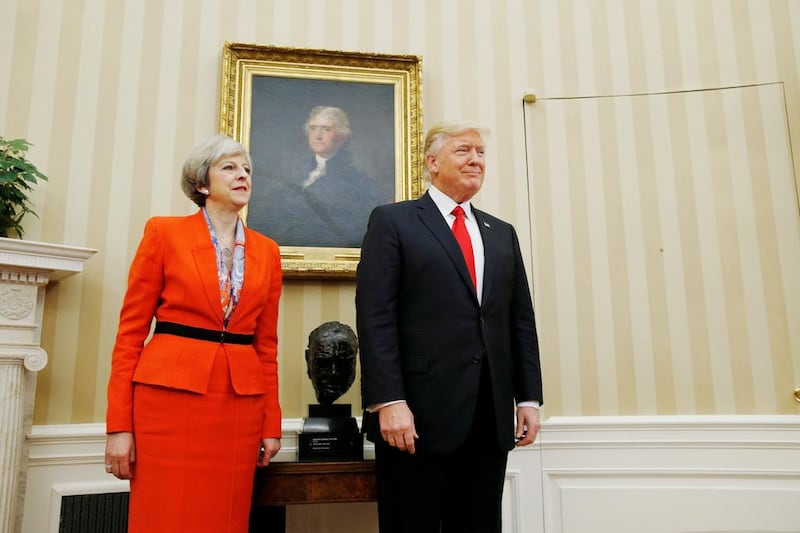We live in an age of disruption. Uber has disrupted the taxi business. Airbnb has shaken the hotel industry. And Donald Trump has shaken up politics. Good. Cosy old ways need to be refreshed and renewed. But Mr Trump has also done something that is not merely disruptive. It is profoundly offensive. In tweeting content that contains the anti-Muslim views of Britain First, a neo-Nazi group, he has offended not only Muslims, but people of all faiths everywhere. He has also deeply irritated the British government. Neo-Nazis believe in "evolutionary humanism". That means that certain human beings evolve into dominant races and others are "Untermenschen," literally sub-human. Neo-Nazis believe that Mr Trump must be superior to Barack Obama purely because Mr Trump is white and Mr Obama is of mixed race. These despicable ideas were defeated on the battlefields of Europe and also defeated by argument, logic, and human experience. Yet from Steve Bannon's poisonous Breitbart propaganda machine to Britain First and similar groups elsewhere, such views are staging a resurgence. Mr Trump's tweets normalise neo-Nazis. As the mayor of London, Sadiq Khan, himself a Muslim, put it: "Britain First is a vile, hate-fuelled organisation whose views should be condemned, not amplified."
Mr Trump plans to visit Britain in 2018. This should be a cause for celebration. Britain has the closest relations with the United States, its indispensable ally. The British admire the American people, love American culture and American products. Prince Harry is to marry a talented American actress Meghan Markle. Any American president in history should be warmly welcomed to cement relations between Britain and the US as the two countries celebrate a spectacular royal wedding. Any president that is, except Mr Trump.
Britain is a divided country, but one thing that unites most people is a profound sense of disappointment about Mr Trump's comments about women, Muslims, Hispanic Americans and African Americans. Ms Markle is of mixed race, something widely celebrated in Britain as another sign that our monarchy and royal family embrace diversity, modernity and the 21st century. Several generations back one of Ms Markle's relatives, probably many more than one, was a slave. And yet Mr Trump's weakness for Breitbart, his relaxed attitude to white supremacist violence, and the repeated occasions on which he has deeply offended different ethnic groups in his wonderfully diverse country have led a leading Democrat congressman Keith Ellison to call the president "a racist".
_________________
Read more from Opinion
[ Russia's summit in Sochi mirrored the 1945 carve-up in Europe ]
[ The rupture of an unholy alliance in Yemen is necessary to end its suffering ]
_________________
In Britain, the home secretary has powers to exclude foreign visitors on the grounds that their presence in the UK is "not conducive to the public good". Like a lot of political and legal phrases no normal person speaks like this. What may be "conducive to the public good" is a matter of judgement. Those banned in the past include law breakers, criminals and those who potentially incite violence. Some 230 people have been excluded in this way since 2005, including the American religious leader the Rev Louis Farrakhan, neo-Nazis and animal rights activists. In 2015, the UK's current prime minister Theresa May, who was then home secretary, excluded an American white nationalist Matthew Heimbach, an under-achieving 25-year-old, who advocated racial segregation.
Banning people and shutting out ideas are rarely good things. People who hold peculiar, even offensive, ideas should be opened up to vigorous scrutiny, debate and disagreement. Britain is a friendly, welcoming, yet disputatious democracy which tolerates more or less anything including a degree of intolerance. Therefore I am shocked that I am writing the following two sentences: it is time to consider whether welcoming a visit by Donald Trump to Britain is truly conducive to the public good. It isn’t.
At first I thought a Trump visit would in some way pull Britain together. The UK is divided about many things, but dismay at Mr Trump’s presidency seems to unite most of us. It extends from the Left to most of the mainstream Right in British and European politics. I had rather hoped Mr Trump might meet Sadiq Khan and taste the British national dish — no longer fish and chips but chicken tikka masala. And so it is with a heavy heart that I have come round to the idea that Britain does not need this visitor who normalises hatred. We have enough home-grown troublemakers including one who wrote, in the words of the Nazis, about a “final solution” to the “problem” of Muslims. A Trump visit will cheer those despicable people and result in demonstrations and discontent. His record in office is of sound and fury and no significant achievements. America’s friends despair of American leadership. Three great enemies tried and failed to destroy the United States — the rebellion known as the Confederacy, then Nazism, fascism and its followers, and finally Russia during the Cold War. Mr Trump is soft on all three enemies of his own country. Britain will remain a great friend to America and Americans, but we have come to recognise that Mr Trump’s loyal friendship is only to himself.
Gavin Esler is a journalist, television presenter and author





